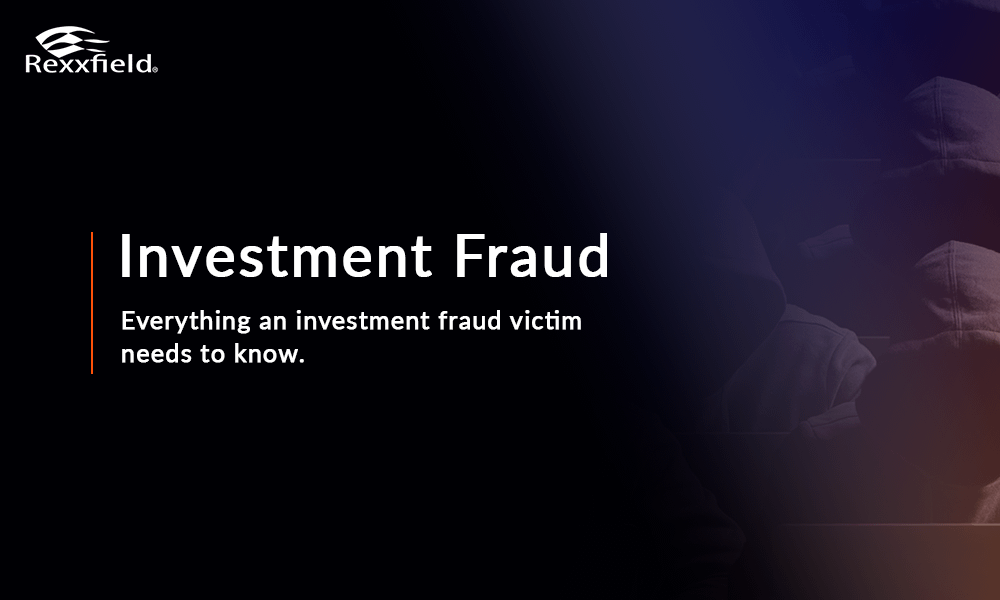Investment fraud is when scammers pretend to be legitimate brokers or financial experts to lure victims into fraudulent schemes. They promise high returns within short time frames, which makes investing highly attractive to unsuspecting investors.
Scammers use all types of means to contact their victims to present their fraudulent investment opportunity: social media, emails, phone calls, etc. They either set up a company which seems very legitimate, or they impersonate a trusted source or reputable company to gain credibility. Many people have the misconception that these scams are easy to recognize, but most investment fraud scams are highly sophisticated, with fake websites, and involve a network of people with multiple roles who appear knowledgeable in finance to build trust.
Almost all victims are lured in by investing small amounts to try it out. Then they are shown fake returns to build confidence, and as trust grows, victims invest larger sums of money. When there is no more money left to invest, or the victims catch on to the scam, the scammers vanish with the victims’ investments.
Investment fraud is a global growing problem. Recent statistics underscore the scale of this issue:
The FBI’s recent reports on investment fraud reveal a significant surge in financial crimes, particularly those involving cryptocurrencies. In 2023, U.S. investors reported a record $5.6 billion in losses due to crypto-related fraud, which is a 45% increase from 2022. These scams represented nearly half of all losses reported by the FBI’s Internet Crime Complaint Center (IC3).
This article covers the most common questions we get from investment fraud victims. But also check out our more comprehensive FAQ about investment scams.
What Are the Earliest Signs of Investment Fraud?

- Fear of Missing Out (FOMO): Scammers often create a sense of urgency to make you think you are missing out on a lucrative opportunity.
- Desire for Quick Gains: They promise fast profits which makes investing highly attractive to those with a desire for quick gains. And who doesn’t like quick returns. However, if it seems too good to be true, it most likely is. Quick gains often come with hidden risks.
- High-Pressure Tactics: When you are pushed to make quick decisions without enough time to assess the situation thoroughly, this is almost always a red flag.
- Impersonation of Authorities: Fraudsters may claim to be from reputable institutions like government agencies or tech companies, to instill fear of consequences to pressure you into compliance.
- Use of Complex Jargon: They may overwhelm you with technical terms or data to appear credible and confuse you into compliance.
Investment scammers are also skilled at leveraging social proof, playing on emotions, and exploiting vulnerabilities. Scams like “romance scams,” “confidence scams,” and the notorious “pig butchering” scams prey on feelings of loneliness and the natural human desire for companionship.
Steps for Investors to Take when Scammed
Recovering from investment fraud can be challenging, especially in cases involving cryptocurrency. But there are certain steps investors can take which can improve the chances of a successful outcome:
Act Quickly: Time is of the essence. Delaying action can significantly reduce the likelihood of recovering funds.
FIAT: Contact Financial Institutions: For fiat currency losses (e.g., USD, GBP, EURO), immediately inform your bank or credit card provider. In some cases, immediate reporting can prevent further fund transfers or reverse transactions.
Report to Authorities: File a complaint with relevant agencies like the Federal Trade Commission (FTC) or your country’s equivalent. Additionally, report the incident to your local law enforcement.
Seek Professional Help: Our investigators specialize in tracing financial transactions and gathering evidence, often essential for legal proceedings and potential recovery. Rexxfield’s team has relationships with litigation attorneys who can hold financial institutions accountable for lapses in their duties, sometimes on a contingency basis. We also have relationships with law enforcement across the globe whom we refer cases to.
And finally, there is something we always tell investment fraud victims who contact us:
- Don’t Cut Off Communication Prematurely: Most people will tell you to cut off all contact, but don’t! If you are still in contact with the scammer, don’t let them know that you know about the scam. Keep playing the game, this contact might be beneficial for any future investigations to trace the scammers.
- Avoid Filing Poorly-Prepared Reports: While filing a report with the FBI’s Internet Crime Complaint Center (IC3) or similar bodies is necessary, it’s crucial that the report is accurate. These reports are hard to fill and comb through, which is why we recommend our clients to wait with filing an IC3 report and let us help fill out the report to make sure it’s well-drafted to avoid delays.
Is it Possible to Get Money Back by Suing the Scammer?
Pursuing civil action to recover lost funds is possible but comes with significant challenges. The key factors include:
- Identifying and Locating the Scammer: Many scammers operate from hidden locations or countries with minimal enforcement cooperation. You also face jurisdiction issues.
- Gathering Evidence: Solid evidence is critical to building a strong case, and skilled investigators can be invaluable in this regard.
- Assessing Recoverable Assets: Suing a scammer is only feasible if they have identifiable assets to recover.
- The biggest risk factor: getting law enforcement to investigate your case and then a prosecutor to take on your case and follow it through to a successful conclusion.
Consulting a lawyer specializing in investment fraud is advisable, though it’s essential to understand that legal proceedings can be lengthy and costly, with no guaranteed outcome. In our experience, most recoveries with scammers overseas, happen through the assistance of law enforcement.
Types of Investment Fraud we Investigate
Investment fraud comes in many forms. Some of the most prevalent that we investigate include:
- Online Trading Frauds
Our Investment Fraud Investigators
We specialize in comprehensive investment fraud investigations to support both civil and criminal actions. Our investigators are experienced in gathering evidence to build a report for law enforcement, locate the scammers, and locate the stolen assets.
Rexxfield collaborates closely with legal specialists who focus on cross-border fraud and international asset recovery. This collaboration allows us to freeze assets and bank accounts tied to offenders, even across different jurisdictions.
We also work with law enforcement across the globe and referred cases to the U.S. Marshals, FBI, USSS, DHS, numerous European, African and Asian cybercrime police agencies, Australian State and Federal police and many private security, and corporate intelligence organizations.
Learn more about our asset recovery services.
Final Thoughts
Falling victim to an investment scam does not reflect your intelligence or awareness. These criminals are skilled, experienced, and well-funded manipulators. But time is a critical factor. So taking swift, and informed action is investment fraud victims’ best chance at a successful outcome.
Contact our investment fraud investigators


